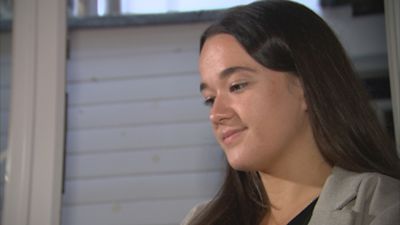Insight
Universities told to crack down on drink and needle spiking as 1 in 10 fall victim

Chloe Keedy reports on the rise of drink and needle spiking - one in 10 young people may have fallen victim - as universities are told to stamp it out by the end of the year
Tia Lines is 23 and just finishing her theology degree at Exeter University.
It was just as she was starting her second year - hoping for some normality after months of Covid lockdowns - that she went on a night out with friends and had her drink spiked.
Less than half an hour after drinking what she thought was a shot of vodka, she collapsed.
What happened next - she only knows because she was lucky enough to be with her friends, who looked after her.
"I have no recollection. Apparently I was confused about where I was - I thought I was in Australia where I used to live… I don't remember getting home from the hospital, I don't remember getting to the bar, getting this free drink. I don't remember walking…
"I have no recollection at all."
Tia’s account is shocking, but what is perhaps even more shocking is how common she tells me this is.
"In my friendship group, nearly all of us would have been spiked and I can guarantee nearly all of us know at least two or three people that have been spiked", she says.
One recent study by the Alcohol Education Trust found that more than one in 10 young adults have been victims of spiking.
The government said on Tuesday that universities should be doing more to stop it happening, and said they must bring in "dedicated policies to protect students by end of year".
Announcing a "new working group" to tackle the problem, the Universities Minister Michelle Donelan told ITV News that "the purpose of this is to forge collaboration between the police, universities, colleges."
"I want to ensure that students have the best tools to deal with these scenarios and that universities have prioritised this as an issue, working with the broader community as most of these instances take place outside the education campuses," Ms Donelan said.
Dawn Dines runs the charity Stamp Out Spiking, and is part of the government’s new working group.
She told me that universities "need to be putting modules in so that students are aware, we also need to be upskilling all the professors in the universities, the lecturers, the safeguarding departments, so that they know the typical symptoms of spiking… they have the correct policy and procedure in place."
But Dawn says it should not just be up to universities to stop spiking.
"We need to be upskilling bar staff, venue management, restaurant owners, street pastors, taxi drivers. Everybody needs to be upskilled so that we understand the symptoms, so that we know what to do when this happens to someone."
But Tia believes that the government and police need to change their approach to this problem before universities can be expected to effectively protect students.
"It can’t just be the whole emphasis on uni. They depend on rules and laws and policies from the government. That’s where it needs to start and universities can use that to support them’," she said.
Tia told me she feels "embarrassed" about what happened to her.
Currently she says too much blame is put on the victim, rather the person responsible. In her case, the person who has left her "scared of people" and what they might do.